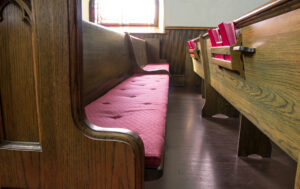By Kie Bowman
The Baptist Press
The 20th century was witness to some remarkable lives, but few were so universally admired as the Albanian nun known as Mother Teresa of Calcutta, India. Her work with the poorest and the most vulnerable people on earth gave her a moral authority rarely seen in modern Western culture.
Yet, the Nobel Prize laureate had a secret. Her spiritual life was dry. Rev. James Martin, who studied her confidential letters, wrote, “I’ve never read a saint’s life where the saint has such an intense spiritual darkness.”
Perhaps some would blame her theology. But, if theology itself is the culprit, how do we explain Charles Haddon Spurgeon? The Baptist pastor suffered from debilitating depression. He once spent weeks in a mental health crisis, crying for hours a day for no reason, unable to work or preach. This kind of episode happened frequently throughout his life. Since the 16th century, when the Spanish Carmelite monk St. John of the Cross coined the phrase “the dark night of the soul,” Christians have had a term to describethe feeling of disconnection from God.
Fortunately, most Christians don’t experience dark depths of spiritual emptiness while trying to pursue God in prayer, but almost all of us have suffered dry spells. During dry spells we may wonder if we’ve lost our spiritual connection to God. We may feel as if the prayer “signal” is weak or disrupted. Dry spells can leave us feeling spiritually bored, as if we’ve lost our incentive to pray. Dry spells are tough. How can you avoid or get out of spiritual dry spells? Here are three actions to take when you’re walking through a spiritual Death Valley.
Confess unconfessed sin
An indefensible relationship exists between our prayer lives and unconfessed sin. Unconfessed sin mangles our prayer life, while a prayer of repentance brings us back into fellowship with God.
King David learned this truth the hard way. In his prayer of confession following his sins of adultery and military-targeted assassination, David prayed, “Create in me a clean heart, O God, and renew a right spirit within me” (Psalm 51:10). He knew his sin had left him internally wounded. That’s why he cried, “… let the bones that you have broken rejoice” (Psalm 51:7-8). His sin had hurt him deeply, and his relationship with God was fractured. He was dry.
No one can successfully ignore the opposing forces of a powerful prayer life and unconfessed sin. That’s why the psalmist flatly declared, “If I had cherished iniquity in my heart, the Lord would not have listened” (Psalm 66:18).
The New Testament, like the Psalms, offers similar invitations. Peter, who was no stranger to sin, said, “Repent therefore, and turn back, that your sins may be blotted out, that times of refreshing may come from the presence of the Lord. …” (Acts 3:19-20).
No wonder John Piper once said, “There are ways to live that hinder prayer, and there is a way to live that helps prayer.” Is there anything you need to confess in order to be refreshed in the presence of God and enjoy a powerful prayer life again?
Worship with God’s people
You will dry up if you attempt to live the Christian life in isolation, apart from congregational worship. The church matters.
The psalmist felt like an animal in the desert dying of thirst. His spiritual life was dry. He confessed, “As a deer pants for flowing streams, so pants my soul for you, O God. My soul thirsts for God, for the living God” (Psalm 42:1-2).
His feelings of disconnection from God forced him to remember a better time. He gushed, “These things I remember, as I pour out my soul: how I would go with the throng and lead them in procession to the house of God with glad shouts and songs of praise, a multitude keeping festival” (Psalm 42:4). His prayer life was better when he prayed and worshiped with other people!
The benefits of church attendance are measurable. A Harvard study found numerous physical and mental health benefits associated with weekly church attendance. In an article reporting the findings, the writer observed, “After all, the research has shown that service attendance, rather than private spirituality or solitary practice, strongly predicts health. Something about communal religious participation appears to be essential.”
There is something irreplaceable discovered in worship with others. Even in prayer we suffer in too much isolation, but we thrive in community.
The writer to the Hebrews said, “And let us consider how to stir up one another to love and good works, not neglecting to meet together, as is the habit of some, but encouraging one another, and all the more as you see the Day drawing near” (Hebrews 10:24-25). The Greek word translated “stir” means to incite or to provoke. Our prayer life “provokes” others to pray, while their prayers incite us to pray. Spiritual provocation occurs when we “meet together” in congregational worship (vv.24-25).
If your prayer life is dry, go to a praying church. Tim Challies recently said, “Prayer is better caught than taught. Do you want to know how to pray? Then spend time with people who pray, and pray with them.”
Live in the Word again
Christians who don’t read the Bible regularly are unlikely to grow spiritually. George Guthrie recently said, “Years of research projects demonstrate that Bible reading is the number one predictor of whether a person is thriving spiritually.” A Christian who fails to read Scripture dries up spiritually. Powerful prayer needs constant motivation, and God speaking to you through Scripture is the best incentive to keep you speaking to Him in prayer.
Jesus said, “If you abide in me, and my words abide in you, ask whatever you wish, and it will be done for you” (John 15:7). Our effectiveness in prayer is directly connected to our time spent studying the Word of God. The two disciplines are inseparable for spiritual growth.
You may occasionally hit a dry spell, but you don’t have to accept it without a fight. If you feel dry, take action to stay refreshed in prayer.
Bowman is senior pastor emeritus of Hyde Park Church and The Quarries Church in Austin, Texas, and the SBC National Director of Prayer.








